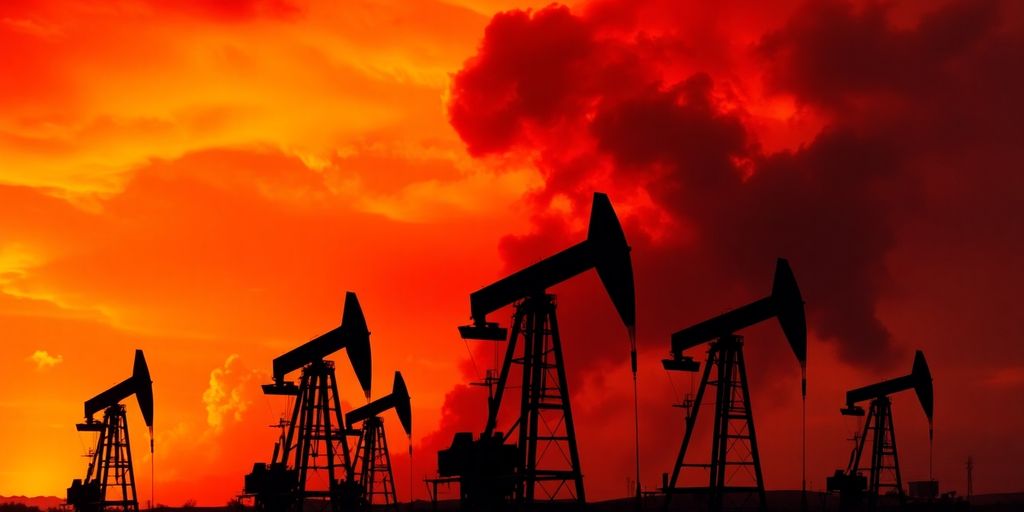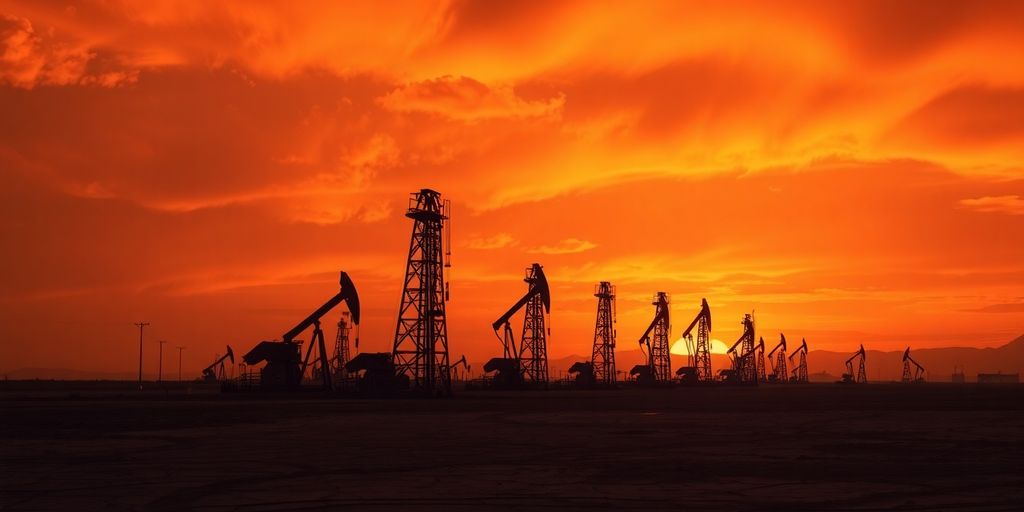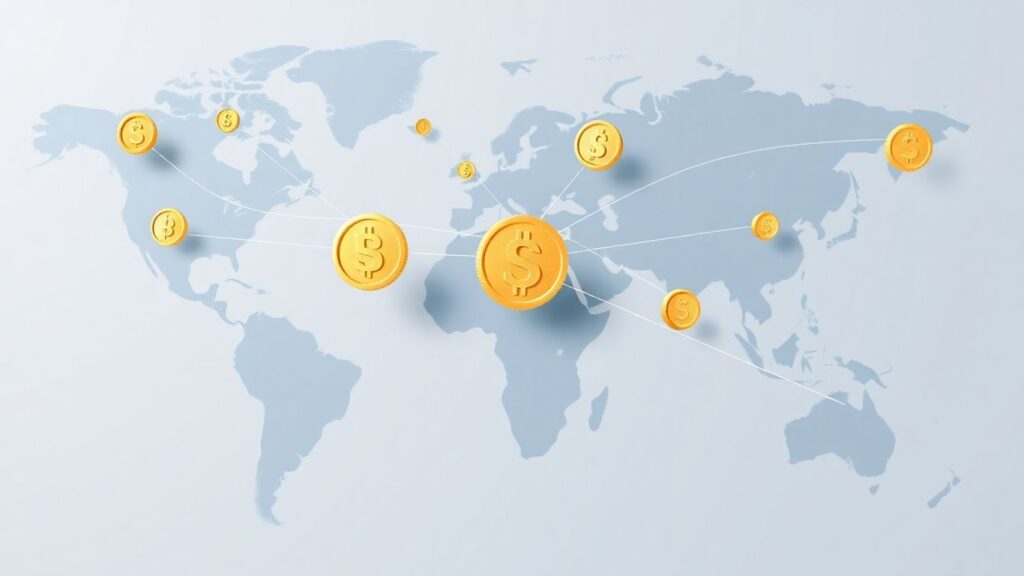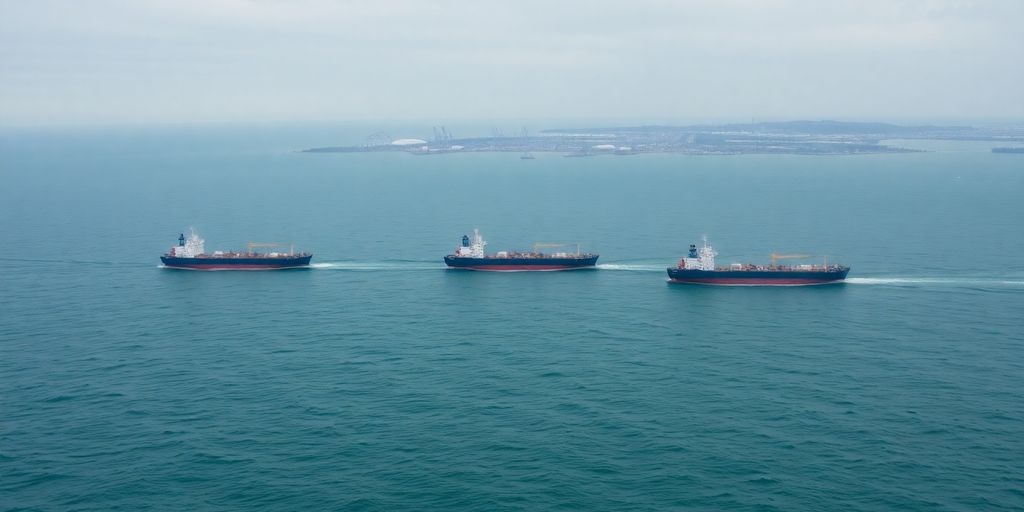Global Oil Markets on Edge as Iran Vows Retaliation Following Escalating Tensions

Things are getting tense in the global oil markets. Iran is saying they’ll hit back after recent events, and everyone’s wondering what that means for oil prices and the world economy. It’s a big deal because the Middle East is super important for oil, and any trouble there can make waves everywhere.
Key Takeaways
- Oil prices shot up and are still jumpy because Iran says it will get even.
- The Strait of Hormuz is a big worry spot; if it gets messed up, oil supply could be in trouble.
- Iran might go after Israel or oil spots in the area as part of its response.
- If oil prices keep going up, it could make things harder for the world economy.
- Lots of countries are telling everyone to calm down and talk things out, not fight.
Oil Markets on Edge as Iran Vows Retaliation
Initial Price Spikes and Volatility
Okay, so things are pretty tense right now. After the U.S. airstrikes on Iranian territory, everyone’s watching the oil markets like a hawk. Prices jumped up pretty fast initially, but they’re still bouncing around as we wait to see what Iran does next. It’s like a rollercoaster – exciting, but also kinda scary. Volatility is the name of the game right now.
Analysts Warn of Further Escalation
Analysts are saying that things could get worse before they get better. A lot depends on how Iran decides to respond. Some think Iran might try to de-escalate, but others are worried about a bigger conflict. Brent crude oil futures are definitely something to keep an eye on. It’s a wait-and-see situation, but nobody’s really feeling calm about it.
Geopolitical Risk Premium Remains Elevated
Basically, the risk premium is still high. That means investors are nervous, and that nervousness is adding to the price of oil. It’s like an extra charge because of all the uncertainty. And honestly, with everything going on, it’s hard to see that risk premium going away anytime soon. The highest levels are a real concern.
Strait of Hormuz: A Critical Chokepoint
The Strait of Hormuz is super important. Like, really important. It’s a narrow waterway, but a huge amount of the world’s oil passes through it every day. Any disruption there could send shockwaves through the global economy. It’s a major chokepoint, and everyone knows it.
Concerns Over Supply Disruptions
If something happens in the Strait of Hormuz, it’s not just a local problem. It’s a global problem. A significant portion of the world’s oil supply travels through this narrow passage. Any disruption, whether it’s due to military action, accidents, or even just political tensions, can cause major price spikes and supply shortages. It’s a risk that everyone in the oil market is constantly watching.
Iran’s Past Threats to Close the Strait
Iran has a history of making threats about closing the Strait of Hormuz. It’s a card they’ve played before, especially when tensions with the U.S. or other countries in the region are high. Whether they would actually go through with it is another question, but the threat itself is enough to rattle the markets. The Iranian parliament is actively considering imposing traffic restrictions on the Strait of Hormuz.
U.S. Naval Presence in Bahrain
The U.S. Navy has a pretty significant presence in the region, with the Fifth Fleet stationed in Bahrain. This is a big factor in the calculations of anyone thinking about disrupting traffic through the Strait of Hormuz. It’s generally believed that it would be difficult for Iran to completely close the strait for an extended period, but that doesn’t mean they couldn’t cause some serious problems.
The presence of the U.S. Navy acts as a deterrent, but it doesn’t eliminate the risk. Even the threat of disruption can have a major impact on oil prices and global trade. It’s a delicate balance of power, and everyone is watching to see what happens next.
Here’s a quick look at some potential impacts:
- Increased shipping costs
- Higher insurance rates for tankers
- Potential delays in oil deliveries
Iran’s Response and Potential Targets
Tehran Condemns Strikes and Reserves All Options
Following the strikes, Iranian officials have come out swinging. Foreign Minister Seyed Abbas Araghchi didn’t hold back, calling the attacks "outrageous" and making it clear that Iran is keeping all options on the table to protect its territory. The Atomic Energy Organisation also chimed in, blasting the attacks as "savage" and even pointing fingers at the International Atomic Energy Agency, accusing them of being involved. It’s a tense situation, and everyone’s waiting to see what Iran does next.
Retaliatory Missile Strikes on Israel
Iran didn’t wait long to make a move. Missiles were launched at Israel, and there were reports of explosions near Jerusalem. This escalation shows how quickly things can spiral out of control in this region. It seems Iran is prioritizing hitting Israeli interests, viewing Israel as a proxy for the U.S., rather than directly engaging with U.S. forces. This approach adds another layer of complexity to the conflict.
Potential Targeting of Regional Oil Infrastructure
Iran has a few options for how to respond, and none of them are good for global stability. Here are some possibilities:
- Direct strikes on U.S. military assets in the region.
- Using allies like the Houthis or Hezbollah to attack energy infrastructure or Western shipping.
- Targeting oilfields or other energy facilities in countries like Saudi Arabia, Qatar, or the UAE.
The exact nature of Iran’s response is still up in the air, but the potential consequences are huge. A major disruption to oil supplies could send prices soaring and throw the global economy into chaos. Everyone’s watching closely to see what happens next.
It’s worth remembering that Iran also relies on the Strait of Hormuz for its own oil exports, mainly to China. This fact adds a layer of complexity to their decision-making process. They have to weigh the risks of disrupting global oil supplies against their own economic interests.
Global Economic Implications of Escalation

Impact on Inflation and Economic Growth
The escalating tensions with Iran are casting a long shadow over the global economy. A major concern is the potential for a significant spike in oil prices, which could trigger inflationary pressures worldwide. This, in turn, could dampen economic growth, as businesses and consumers face higher energy costs. The Trump administration faces a tough balancing act: crippling Iran’s nuclear ambitions while avoiding a prolonged spike in crude oil prices, which would elevate inflation and weaken the U.S. economy.
Historical Precedent of Market Recovery
Historically, Middle East conflicts have caused short-term dips in equity markets. The S&P 500 has often recovered within months. However, the current situation is unique due to the potential for a more widespread and prolonged disruption. The study of geopolitics shows that the global impact of regional conflicts can be significant, especially when they involve major oil-producing regions.
Dollar’s Temporary Safe-Haven Boost
In times of geopolitical uncertainty, the U.S. dollar often experiences a temporary boost as investors seek a safe haven. However, this effect is usually short-lived. A prolonged crisis could erode confidence in the global economy and potentially weaken the dollar in the long run. The oil prices could reach $110 per barrel if oil flows through the Strait of Hormuz are disrupted.
The key question is what comes next. Will Iran attack U.S. interests directly or through allied militias? Will Iranian crude exports be suspended? Will Iran attack shipping in the Strait of Hormuz?
Here are some potential economic impacts:
- Increased energy costs for consumers and businesses
- Higher inflation rates globally
- Slower economic growth due to reduced consumer spending and business investment
International Reactions and Calls for Restraint

Gulf Countries Urge Diplomatic Dialogue
Following the strikes, several Gulf nations have released statements emphasizing the need for de-escalation. Many are pushing for a return to diplomatic talks to resolve the underlying issues. It’s a tricky situation, because regional stability is paramount, and everyone knows further conflict will only make things worse.
Qatar Warns of Catastrophic Repercussions
Qatar’s response has been particularly strong, with officials warning of potentially catastrophic repercussions if the situation continues to escalate. They’re urging all parties to exercise maximum restraint and engage in immediate dialogue. It’s a tense time, and the fear is that any misstep could lead to a much larger conflict.
Saudi Arabia Expresses Deep Concern
Saudi Arabia has voiced deep concern over the escalating tensions, calling for all parties to prioritize stability and security in the region. They’re walking a tightrope, trying to balance their own security interests with the need to avoid further conflict.
The general sentiment seems to be that nobody wants a full-blown war. Everyone recognizes the potential for widespread devastation and economic disruption. The hope is that cooler heads will prevail, and a path towards de-escalation can be found before it’s too late.
U.S. Policy and Market Influence
Trump’s Call to Keep Oil Prices Down
President Trump has made it clear: he wants low oil prices. This stance adds another layer of complexity to the already tense situation with Iran. He’s walking a tightrope, trying to cripple Iran’s nuclear ambitions without causing a major spike in oil prices that could hurt the U.S. economy. It’s a tough balancing act, and the market is watching closely to see how he’ll manage it. The administration is likely finding it difficult to balance crippling Iran’s nuclear ambitions while avoiding a prolonged spike in crude oil prices, which would elevate inflation and weaken the U.S. economy.
Balancing Nuclear Ambitions and Oil Prices
It’s a delicate game. On one hand, the U.S. wants to prevent Iran from developing nuclear weapons. On the other, any aggressive action could disrupt oil supplies and send prices soaring. This could lead to inflation and slow down economic growth. Michael Alfaro, chief investment officer at Gallo Partners, noted the delicate balancing act facing the Trump administration.
Monitoring the Strait of Hormuz
The Strait of Hormuz is a critical chokepoint, and the U.S. Navy maintains a strong presence in the region. Here are some key aspects of the U.S. monitoring efforts:
- Increased naval patrols.
- Intelligence gathering on Iranian activities.
- Coordination with regional allies.
The U.S. is keeping a close eye on the Strait to ensure the free flow of oil. Any attempt by Iran to close the Strait would be met with a swift response. The U.S. understands the global implications of such an action and is prepared to act decisively to protect its interests and those of its allies. The video on People & Media explores the potential for conflict with Iran.
Analysts see broader implications. Jamie Cox of Harris Financial Group suggested Iran, stripped of nuclear leverage, might seek a peace deal, potentially stabilizing oil prices after an initial surge. However, Oxford Economics warns that a severe escalation, like a Strait of Hormuz closure, could devastate global markets. Historically, Middle East conflicts have caused short-term equity dips, with the S&P 500 recovering within months, but the dollar could see a temporary safe-haven boost.
Conclusion
So, what’s next for the oil market? It’s a bit of a waiting game, honestly. Everyone’s watching to see what Iran does. Will they hit back hard, or will things calm down? No one really knows. The Strait of Hormuz is still a big worry, since so much oil goes through there. If anything happens there, prices could really jump. For now, oil prices are kind of up and down, reacting to every little bit of news. It just shows how sensitive everything is right now. We’re all just hoping for things to settle down, but it’s definitely a tense time for the global oil scene.
Frequently Asked Questions
Why are oil prices going crazy right now?
Recent attacks by the U.S. on Iran have made everyone worried. People are afraid Iran will strike back, possibly hurting oil places or shipping routes in the Middle East. This has caused oil prices to jump up and down a lot.
What’s the big deal about the Strait of Hormuz?
The Strait of Hormuz is a narrow sea lane where a lot of the world’s oil passes through every day. If anything happens there, like a blockade, it could stop oil from getting out, making prices skyrocket.
How is Iran reacting to the attacks?
Iran is really mad about the attacks and says it will do whatever it takes to protect itself. They’ve even fired missiles at Israel, which makes people think the fight could get bigger. They might also try to hit oil spots in the area.
How could this affect regular people and the world economy?
If oil prices stay high, it could make everything more expensive and slow down how much money countries make. This means your everyday items could cost more, and jobs might be harder to find.
What are other countries saying about all this?
Many countries, especially those in the Middle East like Saudi Arabia and Qatar, are telling everyone to calm down and talk things out. They’re worried that if the fighting continues, it could cause huge problems for everyone.
What is the U.S. doing about the situation?
President Trump has told everyone to keep oil prices low. The U.S. is also watching the Strait of Hormuz very closely because it’s so important for oil. They’re trying to figure out how to deal with Iran’s nuclear plans while also keeping oil prices from getting too high.








Responses